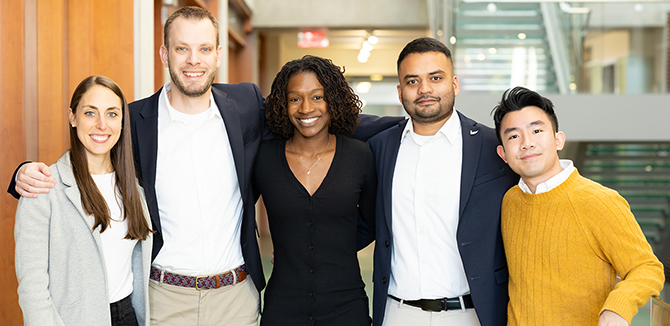Battling Through Uncertainty
mpd² students talk about their ongoing capstone project experience and the journey from ambiguity to a well-defined goal of creating an app to help parents of children with food allergies.

A group of students in Northwestern Engineering's Master of Product Design and Development Management (mpd²) program is finding a way to help ease anxiety for parents of children with food allergies.
In the process, they have learned how to ease their own anxiety when it comes to the ambiguity often found in product development.
The students – Christie Bok (mpd² ‘23), Jordyn Brown (mpd² ‘23), Zach Gooding (mpd² ‘23), Tim Hsieh (mpd² ‘23), and Manu Jha (mpd² ‘23) – teamed up for the program’s capstone project, a three-quarter challenge designed to put students’ classroom learning to the test.
The class culminates with the students giving a 20-minute presentation that includes their solution, business case, and design of their product to an audience of industry leaders and potential investors.
“The capstone project feels like we’re preparing for a Shark Tank pitch,” Hsieh said. “We have nine months to brainstorm ideas, learn about different aspects of product development and entrepreneurship, and apply the knowledge we have learned to design a solution that not only solves meaningful problems but is also highly profitable and marketable.”
Hsieh said coming up with a product that disrupts an industry and makes a true impact in the lives of end-users was a much more difficult task than the group initially anticipated. The team repeatedly returned to its starting point to dive deeper into research before arriving at a solution.
The problem they are addressing is one that needs a solution.
According to Food Allergy Research & Education (FARE), 5.6 million children under the age of 18 in the United States have food allergies. That’s one in 13 children.
More than 200,000 people require emergency medical care for allergic reactions to food in the US each year, FARE research found.
While parents can often carefully control the food their children contact at home, when they hand their kids off to other caregivers such as teachers, friends’ parents, or daycare workers, the situation becomes more dangerous and stressful.
“Our initial focus was solving for the moment when a parent learns of their children’s food allergies,” Brown said. “We have since shifted our focus to bridging the communication gap between parents and caretakers by bringing forward pertinent information about a child’s medical needs.”
That gap-bridger is an app the team is developing to make information sharing easy and effective between parents and caregivers. The students' approach reflects the mpd²’s focus on human-centered design and its goal of solving the spoken and unspoken wants and needs of the end-user.
Much of that in this case centers on addressing the emotions of the parents.
“When a parent leaves their child with a babysitter, our capstone project aims to minimize the stress and anxiety that comes with relinquishing complete control,” Bok said. “It has been a challenging but rewarding experience.”
Fighting through the uncertainty of a massive project designed with limited instructions has been an equally rewarding experience, the students said. The opportunity has taught them lessons about adaptability they believe will be applicable long after they graduate from mpd².
“The process is fluid and will change as you go along, but then an ‘aha’ moment can accelerate the next step very quickly," Gooding said. "Lean on your creativity and don’t be afraid to throw out far-fetched ideas.”
